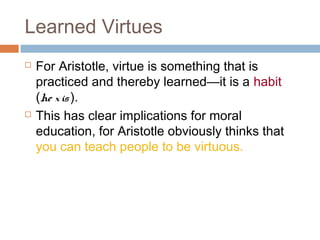Lesson 1
- 1. ARISTOTLE Happiness and the Good Life
- 2. Life of Aristotle Student of Plato (another Greek philosopher) Interested in learning about and reflecting on the natural sciences (botany, physics, biology, astronomy, psychology) Established his own school, called Lyceum Was a personal tutor for Alexander (who later conquered much of the world)
- 3. Virtue Ethics: Becoming a Virtuous Person Ethics must be concrete and practical Virtue ethics focuses on the moral quality of individuals, or how to be a good person Aristotle (384 – 322 B.C.E.): in order to become a virtuous person one must develop a virtuous character.
- 4. Becoming a Virtuous Person A virtuous person is a happy person. What counts is the experience of particulars and not just the knowledge of what is universally true. There is no single science of ‘good’ We find multitude of goods: good medicine, good generalship, good politics Each good has its own end, and each must be judged in terms of the good it aims at.
- 5. Becoming a Virtuous Person In ethics, it’s not just the theoretical that counts, but also the practical: “The ultimate purpose in studying ethics is not as it is in other inquiries, the attainment of theoretical knowledge; we are not conducting this inquiry in order to know what virtue is, but in order to become good, else there would be no advantage in studying it.” (Aristotle, Nicomachean Ethics, Bk, 2, Ch 2)
- 6. What is it to ‘become good’? When we do something, we always have some end in view This end is always good (no one strives for something they consider bad) We often do something for the sake of another But this can’t go on forever. What we want is to find some end, which we value for its own sake. If we find that final end, we need to keep that before our eyes, as a target, so it would guide our lives.
- 7. What is it to ‘become good’? What is this final end, which is our target? Aristotle’s term is ‘eudaemonia’ Happiness Well-being Flourishing
- 8. What is happiness? Everyone wants to be happy. This is the end, our final goal. All other things we do for something else’s sake. We seek only happiness for its own sake. But what is happiness? Pleasure? - not just that Amusement? – not that Fame and Honor? – not that either
- 9. Function (Telos) of Human Beings The function of a flute player is to play flute and we judge her to be good in terms of that. What is the function of human beings? It is the ACTIVITY OF SOUL in ACCORDANCE WITH REASON or AT LEAST NOT WITHOUT REASON.
- 10. Function of Human Beings The soul is the essence of a living human being Humans are being human when are acting in human ways. We have a rational soul so our function is to live accordingly: to live according to our rational souls But an excellent human life is NOT purely an intellectual pursuit. We need to develop both intellectual virtues and moral virtues – that pertain to our social and physical aspects.
- 11. Happiness and Virtues Happiness is not possible without virtues Virtue = ARETE (in Greek) Some virtues that are necessary for happiness: Wisdom Pleasure (because the lives of those who live rationally with excellence are pleasurable) We also need a certain amount of good fortune (happiness is not entirely in yourcontrol)
- 12. Happy Life A happy life is a life of activity Happiness is not something that happens to you. It’s not passive. It’s the activity of your soul in accordance with excellence.
- 13. Becoming a Virtuous Person To be moral requires that you know what you are doing, deliberately choose to do it, and do it as an example of a settled and immutable moral state. ** Finding the proper balance between two extremes. Excess: having too much of something. Deficiency: having too little of something. Not mediocrity, but harmony and balance. Virtue is to seek the mean, or middle ground, between vices. vice vice VIRTUE
- 14. Virtues and Vices Cowardice – Courage – Foolhardiness Inhibition – Temperance – Overindulgence Stinginess – Generosity – Profligacy Shabbiness –Magnificence – Vulgarity Standoffishness – Friendliness- Obsequiousness Shyness – Proper pride – Vanity Celibacy – Monogamy – Promiscuity Dullness – Well-roundedness – Wildness Sarcasm – Truthfulness – Boastfulness Shamelessness – Modesty - Shamefacedness VirtueVice Vice
- 15. Learned Virtues For Aristotle, virtue is something that is practiced and thereby learned—it is a habit (he xis). This has clear implications for moral education, for Aristotle obviously thinks that you can teach people to be virtuous.
- 16. Think about it: What do you think is the function (telos) of a human being? What is the distinctive quality of being human? How does pleasure come into a good life? Can you teach people to be virtuous? Is it true that the ability to reason is unique to humans? Can wicked people still act reasonably by avoiding extremes?















